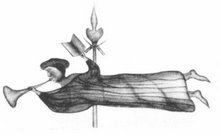The Wentworth Svithe
.
If John Wentworth had never asked Joseph Smith about Mormonism, would Joseph Smith ever have written the Articles of Faith?
And if he had never written the Articles of Faith, how would our self-perception differ today?
The AofF as originally written:
We believe in God the eternal Father, and in His Son Jesus Christ, and in the Holy Ghost.
We believe that men will be punished for their own sins, and not for Adam’s transgression.
We believe that through the atonement of Christ all mankind may be saved by obedience to the laws and ordinances of the Gospel.
We believe that the first principle and ordinances of the Gospel are: (1) Faith in the Lord Jesus Christ; (2) Repentance; (3) Baptism by immersion for the remission of sins; (4) Laying on of hands for the gift of the Holy Ghost.
We believe that a man must be called of God by prophecy and by the laying on of hands, by those who are in authority, to preach the Gospel and administer in the ordinances thereof.
We believe in the same organization that existed in the primitive Church, viz.: apostles, prophets, pastors, teachers, evangelists, etc.
We believe in the gift of tongues, prophecy, revelation, visions, healing, interpretation of tongues, etc.
We believe the Bible to be the word of God, as far as it is translated correctly; we also believe the Book of Mormon to be the word of God.
We believe all that God has revealed, all that He does now reveal, and we believe that He will yet reveal many great and important things pertaining to the kingdom of God.
We believe in the literal gathering of Israel and in the restoration of the Ten Tribes; that Zion will be built upon this [the American] continent; that Christ will reign personally upon the earth; and that the earth will be renewed and receive its paradisiacal glory.
We claim the privilege of worshiping Almighty God according to the dictates of our own conscience, and allow all men the same privilege, let them worship how, where, or what they may.
We believe in being subject to kings, presidents, rulers and magistrates, in obeying, honoring, and sustaining the law.
We believe in being honest, true, chaste, benevolent, virtuous, and in doing good to all men; indeed we may say that we follow the admonition of Paul, We believe all things, we hope all things, we have endured many things, and hope to be able to endure all things. If there is anything virtuous, lovely, or of good report, or praiseworthy, we seek after these things.



